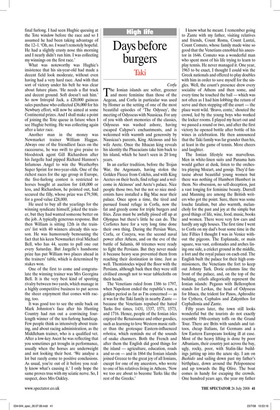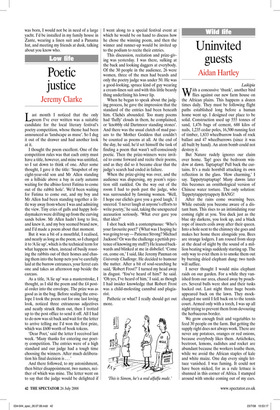Days before burgers
Taki
Corfu The Ionian islands are softer, greener and more feminine than those of the Aegean, and Corfu in particular was used by Homer as the setting of one of the most beautiful episodes of ‘The Odyssey’, the meeting of Odysseus with Nausicaa. For any of you with short memories of the classics, Odysseus was washed ashore, having escaped Calypso’s enchantments, and is welcomed with warmth and generosity by Nausicaa’s parents, King Alcinous and his wife Arete. Once the Ithacan king reveals his identity the Phaeacians take him back to his island, which he hasn’t seen in 20 long years.
In an earlier tradition, before the Trojan War, the Argonauts, having stolen the Golden Fleece from Colchis, and with King Aeetes on their heels, find refuge and a welcome in Alcinous’ and Arete’s palace. Nice people those two, but the not so nice modernists have installed a Big Mac near their palace. Once upon a time, the tired and pursued found refuge in Corfu, now the fat and greedy come for triple burgers and fries. Zeus must be awfully pissed off up at Olympus but there’s little he can do. The Corfiotes have for a very long time done their own thing. During the Persian Wars, Corfu, or Corcyra, was the second naval power after Athens, and on the eve of the battle of Salamis, 60 triremes were ready to fight the Persians. But they never made it because heavy seas prevented them from reaching their destination in time. Just as well. Themistocles wiped the floor with the Persians, although back then they were still civilised enough not to wear tablecloths on their heads.
The Venetians ruled from 1386 to 1797, when Napoleon ended the republic’s run, a golden period as far as I’m concerned — as it was for the Taki family in nearby Zante — because the Venetians repulsed the hated Turks five times, 1431, 1537, 1571, 1573, and 1716. Hence, people of the Ionian isles enjoyed the Renaissance and other goodies, such as learning to love Western music rather than the grotesque Eastern-influenced rebetica, which reminds me of the sounds of snake charmers. Both the French and after them the English did good things for the island — agriculture, education, roads and so on — and in 1864 the Ionian islands joined Greece to the great joy of all Ionians, except for one of my ancestors, who wrote to one of his relatives living in Athens, ‘Now we too are about to become Turks like the rest of the Greeks.’ I know what he meant. I remember going to Zante with my father, visiting relatives and friends, Count Roma, Count Luntzi, Count Comuto, whose family made wine so good that the Venetians ennobled his ancestor in 1646. Comuto was a wonderful man who spent most of his life trying to learn to play tennis. He never managed it. One year, 1963 to be exact, I thought I could win the Greek nationals and offered to play doubles with him in order to save myself for the singles. Well, the count’s presence drew every socialite of Athens and then some, and every time he touched the ball — which was not often as I had him lobbing the return of serve and then stepping off the court — the place went wild. ‘Bravo, conte,’ shouted the crowd, led by the young boys who worked the locker rooms. I played my heart out and we passed a round or two, and after the first victory he opened bottle after bottle of his wines in celebration. He then announced that the Taki family was far grander than his, at least in the game of tennis. More cheers and laughter.
The Ionian lifestyle was marvellous. Men in white-linen suits and Panama hats would gather at dusk, listen to the orchestra playing Mozart, and gossip. They’d fantasise about beautiful young women but there was nothing of Humbert Humbert in them. No obsession, no self-deception, just a vast longing for feminine beauty. Durrell and Manning are among the British writers who got the point. Sure, there was some louche fatalism, but also warmth, melancholy for the past and joy at the simple but good things of life, wine, food, music, books and women. There were very few cars and hardly any ugly houses. The first time I went to Corfu on my dad’s boat some time in the late Fifties I thought I was in Venice without the pigeons. The Esplanade, or main square, was vast, collonades and arches lining one side, a cricket ground in the middle, a fort and the royal palace on each end. The English built the palace for their high commissioners, the Venetians the fort to keep out Johnny Turk. Doric columns line the front of the palace, and, on the top of the building, reliefs allegorically represent the Ionian islands: Pegasus with Bellerophon stands for Levkas, the head of Odysseus for Ithaca, the trident for Paxos, Aphrodite for Cythera, Cephalos and Zakynthos for Cephallonia and Zante.
Fifty years later, the town still looks wonderful but the tourists do not exactly resemble 19th-century toffs on the Grand Tour. There are Brits with sandals and tattoos, cheap Italians, fat Germans and a few Eastern Europeans looking ill at ease. Most of the heavy lifting is done by poor Albanians, their country just across the bay, ugly, rocky, poor, with Stalin-like buildings jutting up into the azure sky. I am on Bushido and sailing down past my father’s birthplace, down around the Peloponnese and up towards the Big Olive. The boat comes in handy for escaping the crowds. One hundred years ago, the year my father was born, I would not be in need of a large yacht. I’d be installed in my family house in Zante, wearing a linen suit and a Panama hat, and meeting my friends at dusk, talking about you know who.



























































 Previous page
Previous page